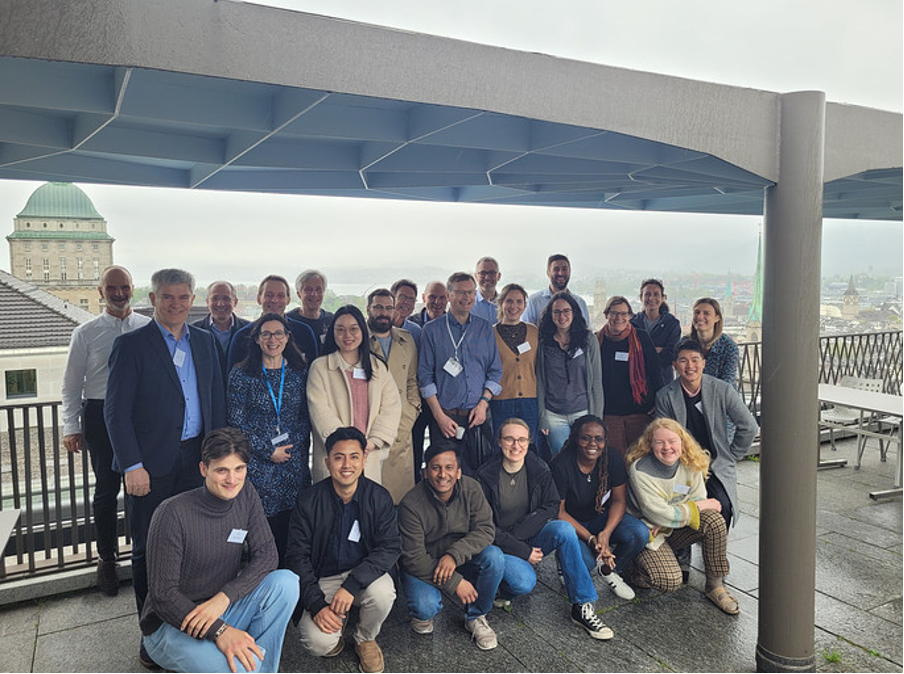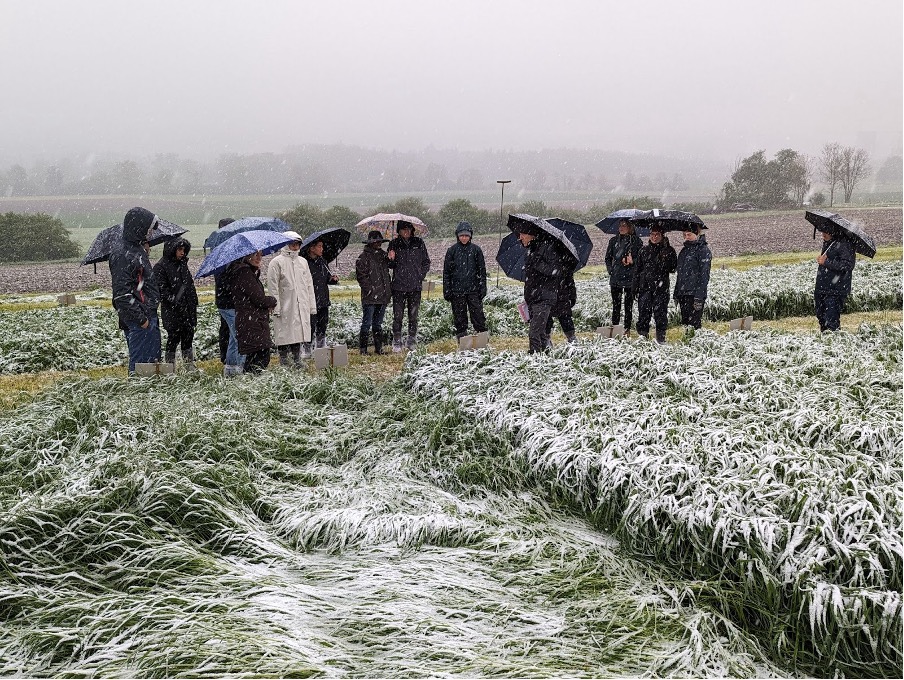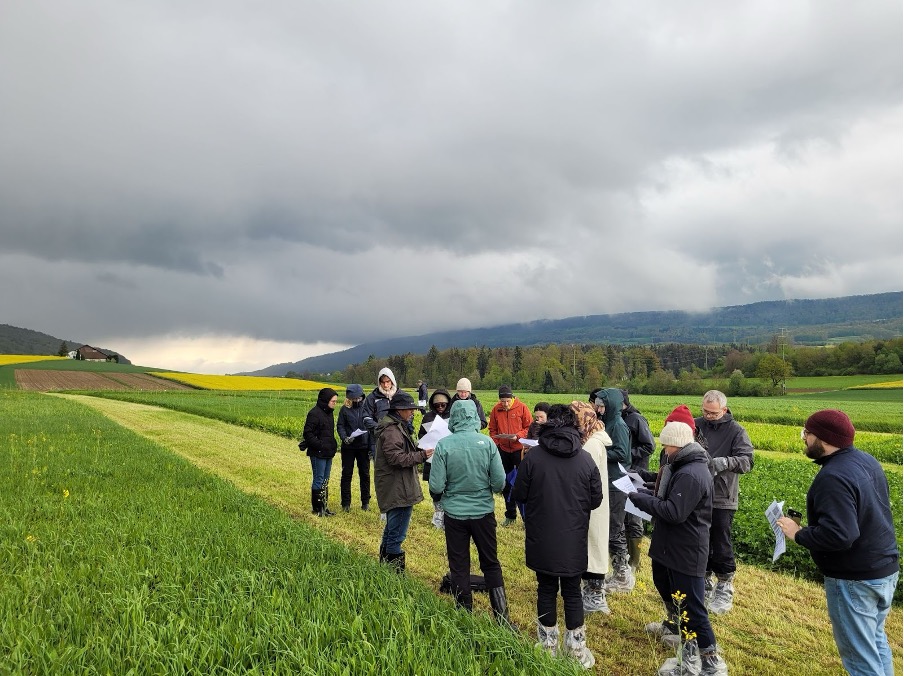LegumeLegacy Event in Switzerland
This blog post is dedicated to the LegumeLegacy event that took place in Zürich this April!
The MSCA LegumeLegacy Doctoral Network organizes biannual in-person events to gather all project participants and provide intensive training to the Doctoral Researchers. This time, the event was hosted by our partners in Switzerland: Agroscope and ETH Zürich. Leveraging the specialties of these two institutions and their roles in the project, this event emphasized training in grassland systems and mixtures, plant breeding, molecular tools, and data science applied to grassland breeding. The Doctoral Researchers had the opportunity to attend lectures by experts, participate in discussion panels, and engage in hands-on laboratory and field activities. The event was also marked by the presence of a special guest: the EU Project Officer.
Presentation to the Project Officer
This LegumeLegacy event was particularly notable for the presence of the EU Project Officer as part of the midterm check. The Doctoral Researchers were invited to hold a presentation to provide insights and updates on their doctoral projects. After each presentation, the reserved time for questions evolved into an exciting and enriching discussion among Doctoral Researchers, Principal Investigators, and the Project Officer. We were a little bit nervous to be honest to meet the Project Officer and present our research to the whole group. However, afterwards we were all very delighted by how it went. We even got compliments from the Project Officer and the Principle Investigators on our presentation skills at this stage of our PhD. This was a real confidence boost. It was also inspiring to see the rapid progress of the projects, the development of the Doctoral Researchers within their own expertise, and how this doctoral network fosters opportunities for interdisciplinary partnerships.

Principal Investigators, Doctoral Researchers and the EU Project Officer gathered together after the Doctoral Researchers’ presentations.
Lectures on Grassland Systems, Molecular Tools, and Statistics
Throughout the event, numerous lecture sessions were held. These lectures were presented by principal investigators and invited researchers from Agroscope and ETH Zürich. The theoretical training, filled with opportunities for discussion, focused on grassland systems in Switzerland, plant breeding, molecular plant breeding, data science applied to bioinformatics and molecular plant breeding, grassland mixture development, and biodiversity-productivity relationships in experiments.
Sechseläuten Festivity on Monday
Apart from the insightful lecture sessions, this training also organized entertainment activities. At the end of our first training day, we had the chance to witness a typical Zürich tradition: Sechseläuten! In Zürich German this is called Sächsilüüte meaning “The six o’clock ringing of the bells”. This is a traditional holiday in Zürich which is celebrated on the third Monday of April. A parade of guilds walks through the city dressed in typical authentic outfits making music along the way. There were so many people on the streets! The highlight of the event is the burning of the Böögg. This is a statue composed of flammable compounds and explosives. The tradition says that the burning of the Böögg gives an indication of the weather conditions of the upcoming summer. If the head of the Böögg explodes quickly, summer is believed to be nice: warm and sunny. If it takes a long time before the head explodes, summer will be cold and rainy. Unfortunately, there were heavy winds on Monday, so the burning of the Böögg was cancelled for safety reasons. We guess summer weather will be a big surprise now! Luckily we could still witness the parade marching through the city. Afterwards, we went to look for an affordable place to have dinner - something that is not so convenient in the expensive city of Zürich. Eventually, we found a place and enjoyed a pizza or a pasta, and each other's company.
Molecular Plant Breeding Workshop
Besides absorbing information from the interesting lectures, we also had the opportunity to get some hands-on experience in the lab. Linn professionally guided us through the protocol to extract DNA from leaves of different apple cultivars. Linn’s aim in the LegumeLegacy project is to measure how the different cultivars of the grass, legume and herb species establish and survive in different species mixture compositions. Some of us already had some lab experience, but for others, it was their first time in a lab. However, everyone did an excellent job at the end and we had a lot of fun doing so.

Linn explains the different steps of the protocol to the Doctoral Researchers.
Field Excursion on Thursday
The weather forecast warned of an approaching snowfall as we set off for the Agroscope fields. You could easily spot the seasoned veterans among us - the Doctoral Researchers who were used to working at the LegumeLegacy fields site under these weather conditions. They looked like they were ready for an Arctic expedition, and rightfully so, as those of us who dressed lightly quickly regretted it. Upon arrival, we immediately immersed ourselves in the task of checking and comparing various species and varieties. However, our plans were interrupted by heavy snowfall, prompting us to seek warmth with a comforting coffee break.

Principal investigators and Doctoral Researchers in the Agroscope fields learning the species and varieties in the April snow.
As the snow gradually stopped and transitioned into rain, we seized the opportunity to explore the Greenhouse, where clovers were undergoing incubation and planting. Here, we gained valuable insights into the intricate breeding process, learning that it could take more than a decade to meticulously select advantageous varieties. Despite the challenging weather conditions, we remained determined in our pursuit of knowledge. We then ventured to witness LegumeLegacy fields on Swiss sites demonstrated by Prasanth, though our time was cut short by a sudden downpour. Swiftly, we sought shelter, concluding our visit in a farm under the welcoming embrace of sunshine.
After a chilly day in the fields, one might typically yearn for a cup of warm tea or a mug of hot chocolate to close the day. Yet, just as the day’s weather had been unpredictable, so were our preferences. Contrary to most expectations, Ellen surprisingly expressed a craving for ice cream!

Prasanth illustrated the LegumeLegacy fields in Swiss sites.
Reflecting on our training in Switzerland, our visit to the Agroscope fields stands out as a reminder of the resilience and adaptability required in agricultural research. Despite the unpredictable weather conditions, our experiences navigating through snow and rain only served to enrich our understanding of crop breeding and farm management.
As we bid farewell to the lush landscapes of Switzerland, we carry with us not only the agricultural and ecological knowledge gained but also the memories of unity forged amidst the challenges of nature. The value of our time here cannot be overstated. The week was truly remarkable, not only for the agricultural insights but also for the team spirit developed among us. Our social dinners with Doctoral Researchers and principal investigators were filled with laughter and engaging discussions, drawing us closer together and enhancing our collective experience.
This blog post was written by the Doctoral Researchers Ellen Baekelmans, Die Hu and Sophia Philadelphi.
